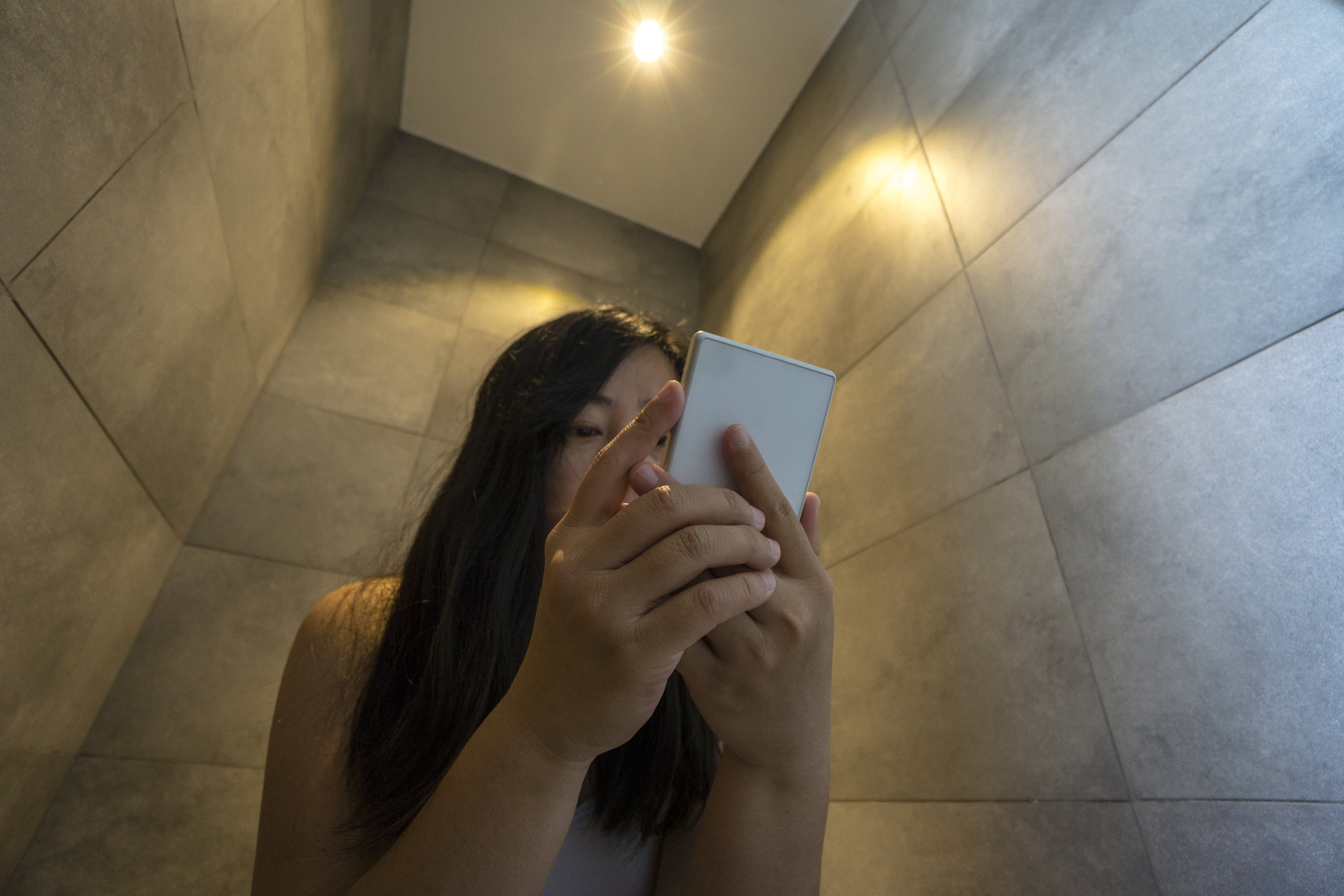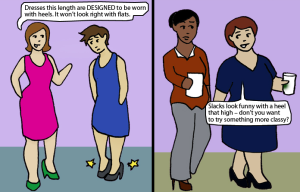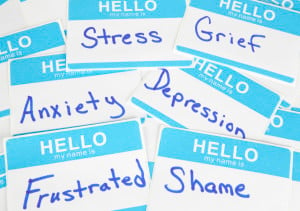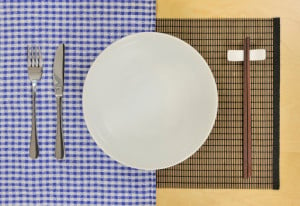
Person looking at smart phone in the bathroom.
I was in the bathroom when I realized there’s a problem with how I use social media. Although I was only going in briefly, I felt the need to bring my phone and use it to check my social media accounts.
I scrolled through Facebook, Twitter, and Instagram — all in a matter of minutes — retweeting news about book deals and liking my friend’s latest photo of her travels abroad.
I do the same thing when I first wake up in the morning, before I go to sleep, while in long lines at the grocery store, and when I’m commuting on the train. I don’t know if I have a full-blown social media addiction, but I definitely have toxic, harmful social media habits.
This can be difficult to admit, especially for anyone who has already been through trauma or overcome an addiction. We don’t like to think of ‘harmless’ behaviors like binge-watching TV, checking Facebook, or going online as addictive.
I have a family history of drug and alcohol addiction and overcame an eating disorder that was rooted in the same constant desire for control, so it was actually painful to think of my social media habits as toxic and addictive.
If you think you might have a social media addiction — or even some toxic habits that are keeping you up late into the night sighing over your newsfeed or experiencing a constant fear of missing out (FOMO) — it’s important to try to find a way to heal and move forward, even if going cold turkey forever isn’t possible.
Here are some ways to start:
1. Break the need to compulsively check-in
I have ADHD and some signs of undiagnosed obsessive-compulsive disorder (it runs in the family), and it shows up most in my compulsive need to check social media.
I’m that person who clicks on a notification the moment a red number “1” appears, and I can’t even look at my friends’ emails with over 5,000 unread messages without breaking into a cold sweat.
If you have any issues with this, it’s helpful if you can identify the toxic behavior and find ways to remove the temptation. I’d gotten into a toxic habit of checking my phone for every notification, along with any time I experienced slight boredom.
What helped the most was literally removing the temptation, such as turning off the notification settings on my phone. Doing so makes it so that if someone tags me in a Facebook post, instead of seeing it, I’d have to actively click on the app to find out.
At first, I felt a little uneasy. Thoughts like, “But what if I miss something important?” ran through my head, which weren’t completely wild notions given that part of my job is to manage social media accounts.
Also, there are several people who I am only connected to on social media — people who don’t even have my phone number or address. And many of my friends have gotten into the habit of contacting me online, whether it’s an Instagram direct message or a Facebook event invite instead of a physical invitation.
In my experience, in addition to turning off notifications, it may help to not bring your phone with you. Try leaving it in the other room. Leave it in the car. Leave it in your purse or pocket and commit to not taking it out.
2. Treat social media like any other addiction
If you’re already working on any other addictive behaviors, social media can set back your recovery. But, even if you’re not, reframe how you think about it — toxic habits online can be just as difficult to break and as invasive to our lives as any other toxic habit.
Social media is particularly insidious because it’s consuming and hard to get away from, especially if you own a smartphone or another Internet-connected mobile device. Also, there are real safety or work-related reasons you might need to keep your cell phone on you, which can make it hard to break the habit of checking in.
It may not be possible to completely divest from social media, but you can be more mindful of the habits you’ve made and what effects they have on you.
For instance, I started using my smartphone in bed when I was still in college. I have trouble sleeping at night and my parents always taught me not to ‘force it,’ but to instead stay up and out of bed until I was actually ready to sleep.
With several roommates in my apartment, I felt I really couldn’t do that in college without disturbing someone else, so I went to bed when everyone else did — I just used my phone to read news and check social media in bed before falling asleep.
Now I’ve had that habit for four years and it’s tough to break. Even though I now have an apartment and go to bed only when I’m tired, I feel compelled to check my phone before closing my eyes.
It might seem harmless, but it’s really hurting my nighttime routine. One night I got into a long discussion with my partner about a book we’d just read instead of checking my phone and before I knew it, an hour had passed.
But this conversation was a much more fulfilling way to spend an hour than liking Instagram pictures of colorful hair and reading political debates; I went to bed feeling happy and energized.
This is just one example of why we need to treat a social media addiction as seriously as we would treat any other: it has real consequences on our relationships, mental and physical health, and our behaviors.
3. Consider therapy and serious introspection
Although social media addiction isn’t a diagnosable disorder, if we’re treating it as seriously as other addictive behaviors, it might be worth seeking professional mental health help. Talk to a mental health professional about the habits you’re trying to break, how they make you feel, and what you think reasonable goals might be.
Even if seeking therapy or another form of help such as a support group isn’t an option, you can also dedicate yourself to serious introspection. Make a point to write out and reflect on how you’re using social media now.
Are you checking in while you’re out with friends, and does this make you feel isolated from them? Are you frustrated when you can’t check your phone for a few hours or longer?
Not too long ago, I was banned by Facebook for three days; I wasn’t given a formal explanation, but it’s something that has happened to some of my other marginalized and feminist friends.
At first, I was really shocked and upset. I was able to log in and use my news feed, but I couldn’t react, comment, or share anything, I couldn’t post, and I couldn’t even use the Messenger app.
Then I decided to give myself a three-day break. I wouldn’t check it at all, so that would remove the temptation to like a cute photo of my friend and his boyfriend when I knew I wouldn’t be able to.
This forced me to take three days to take a hard look at my social media habits. I stopped taking my phone into the bathroom with me, and got a lot more reading done than I normally do — something I didn’t expect because I already read books often and quickly.
I’d never realized how my social media habits cut into the time I spend doing everything else: Cooking, cleaning, taking walks, talking to my girlfriend, calling my cousin, hanging out with friends and family, writing, or creating art.
This kind of introspection reminded me that my toxic social media habits are a serious problem, especially because I defaulted to using Instagram, Twitter, and Tumblr more to make up for my lack of Facebook. It didn’t really solve my problem, just replaced a vehicle for addiction with another.
We need to make it an ongoing part of maintaining our mental and physical health to look at what our social media behaviors are and how we can find something that’s more sustainable. For me, it’s breaking my habit of checking my phone in certain scenarios and scrolling mindlessly.
Instead, I now give myself limits of going online just to see some people’s family holiday photos and post my own. After fifteen or twenty minutes, I move on to another task and move my phone physically away from me so that I’m not tempted to pick it up.
****
This Establishment article about television addiction suggests that we need to think intentionally about how we spend our time, especially since it’s technically possible to become emotionally addicted to any behavior.
I’ve often joked about being addicted to books since I was featured on a local TV channel in middle school for reading over fifty books before November. But really, this it isn’t true; I could put down the latest Harry Potter novel if I wanted to hang out with my best friend.
There are definitely benefits to social media use, and there are times when I do feel like I’m using it responsibly — but it’s all about defining when. Ask yourself some basic questions on a daily basis.
Does this feel healthy and fulfilling, or does it feel leave you feeling drained, exhausted, angry, anxious, or another upsetting emotion? Toxic habits look different for individual people, so it’s important to think about how we’re feeling both in the moment and hours or days after our social media experiences.
I don’t want technology to have a hold over me any more than I want to dive into the work addiction that I’ve noticed myself slipping into. I’ve realized I need to treat it like I would any other toxic behavior — identifying it and actively working to change it for the positive.
[do_widget id=’text-101′]
Alaina Leary is an Everyday Feminism Reporting Fellow. She is a Bostonian currently studying for her MA in publishing at Emerson College. She’s a disabled, queer activist and is on the social media team at We Need Diverse Books. She can often be found re-reading her favorite books and covering everything in glitter. You can find her at her website or on Instagram and Twitter @alainaskeys. Read her articles here.
Search our 3000+ articles!
Read our articles about:
Our online racial justice training
Used by hundreds of universities, non-profits, and businesses.
Click to learn more




















